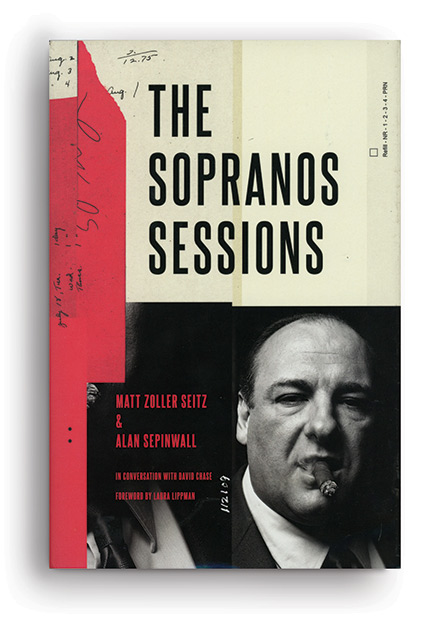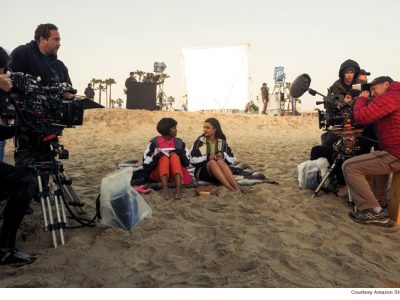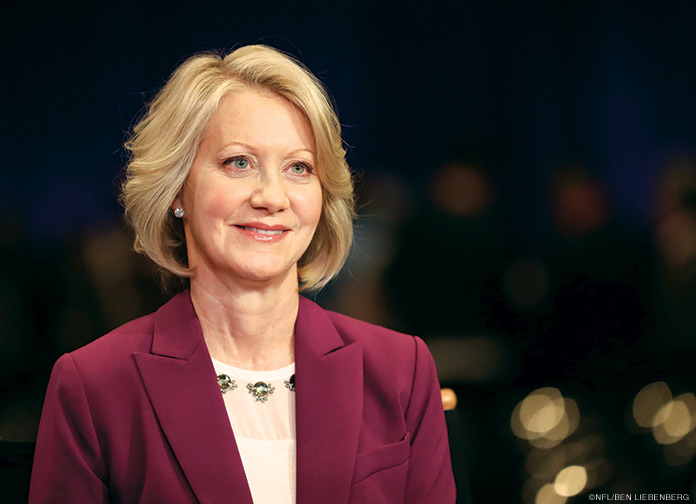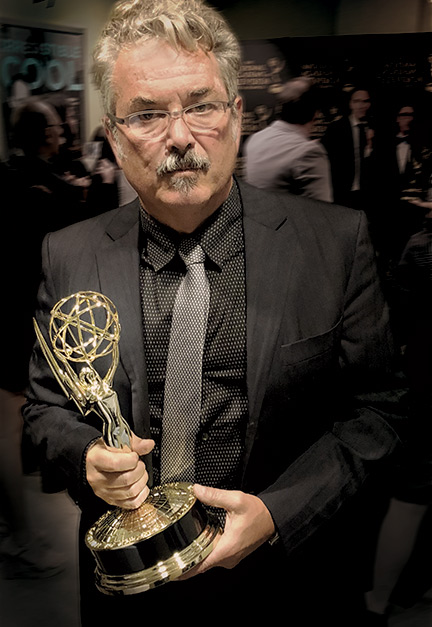
By Matt Zoller Seitz & Alan Sepinwall C’96
Abrams Press, 2019, $30.00
Alan Sepinwall C’96 dives deep into one of television’s greatest shows.
Back at Penn, when he wasn’t going to class or working as 34th Street’s managing editor, Alan Sepinwall C’96 spent a lot of time watching his then-favorite show NYPD Blue and writing about it (you can still find his old articles at stwing.upenn.edu/~sepinwal/nypd1.html).
That led to a job out of college as a reviewer at the Star-Ledger in Newark, New Jersey, and laid the groundwork for him to become one of the country’s most well-known TV critics. Sepinwall, who now writes for Rolling Stone, after previous stops at the websites HitFix and Uproxx, has published several books on television, including The Revolution Was Televised (2013);TV (The Book) (2016), coauthored with Matt Zoller Seitz; and Breaking Bad 101 (2017).
His latest book, The Soprano Sessions, on HBO’s famed mobster series, also coauthored with Seitz, is a callback to both writers’ roots, as each first wrote about the show while working at the Star-Ledger—the newspaper, Sepinwall proudly notes, that sits at the end of main character Tony Soprano’s driveway.
Timed to coincide with the 20th anniversary of the series’ debut, the book provided an opportunity, Sepinwall says, to bring back to center stage “this great and important show that seemed to be dropping out of the conversation a little bit in terms of what’s the best show of all time,” as it’s been obscured by more recent favorites like Mad Men or Breaking Bad, “which would not have existed if not for The Sopranos.”
Gazette associate editor Dave Zeitlin caught up with Sepinwall to discuss how the book came to be, where he ranks The Sopranos and the late actor James Gandolfini (who played Tony) on his TV Mount Rushmore, and how he keeps up with so many damn television shows these days. The interview has been edited and condensed.
I was struck by how thorough the book was, with essays devoted to every Sopranos episode, plus interviews with series creator David Chase, and more. How did you and Matt come up with the structure and then write it?
We had separately done books—I did one on Breaking Bad, he did one on Mad Men—that featured the same episode-by-episode recap format. The interviews with Chase were new; that was one of the things we wanted to do for the value added. We also knew we wanted to include some archival material from when we were at the paper together, which is in the back of the book.
In terms of the process, we split it up initially based on the seasons we covered at the paper. Matt wrote the first drafts of the recaps for seasons one through three; I did the first draft of the recaps from season four on. And then I would tweak his stuff and he would tweak my stuff. The interviews we did together with Chase, and then it was just a matter of editing them down. There was a lot that we talked about that there was just not room for in the book—or the book would have weighed 20 pounds and cost $80.
The Sopranos is often credited with ushering in a new golden age of TV. What do you think made it so far ahead of its time?
For 50 years before The Sopranos came on, television had a lot of these unwritten rules, about what the audience would and would not accept and what you could get away with. The main character of a show ultimately had to be likable; if you had a villainous character who was prominent, there had to be a hero put next to him; you couldn’t tell super-serialized stories; you couldn’t have narrative complexity; you couldn’t have moral complexity. Basically all of the things The Sopranos did, we had been told for 50 years you couldn’t do.
And The Sopranos became a big hit, a critical darling, and eventually an awards magnet. [Then] other people started copying it. Basically any show you just binged on Netflix owes some trace of its DNA to The Sopranos.
For those who haven’t seen the show, how well do you think it holds up today? And does it work well for people to re-watch, perhaps while using your book as a guide?
The goal was to make a book where you could do a re-watch and after each episode you turn to that essay and you read it. But you can also read it without having to re-watch the show.
That was the one thing I was worried about when we agreed to do the project—it had been a long time since I watched the show and would it hold up? Or would it seem like this dusty, old relic? But to my pleasant surprise, I really liked it better this time than I did back then. Obviously it’s dated in some ways because of the fashion and technology, but it really holds up quite well, especially if you look at it as a turn-of-the-millennium period piece.
But also, if you’re watching it a second, third, fourth time, you already know what happens, so you’re not spending a lot of time speculating and imagining scenarios that are not going to come to light. And so you can focus on what the show really did moment to moment. There are other shows that came after it that are more consistent and tell better overall stories, but in each particular moment—thematically, character wise—I don’t think there’s been a drama that’s ever been better than this one.
What was it like to do a bunch of long interviews with David Chase, who it seems doesn’t always love talking to the media?
Oh, he never loves it. He is one of the three or four most challenging interviews I’ve ever had, and that was true for this as well. Most people are trained to give you some kind of answer, even if it’s not exactly to the question you asked. Chase is not wired that way. Chase will interrogate you about your reason for asking that, or what it means, or just dismiss your premise altogether.
Also, we were talking about a show that was made 20 years ago. A lot of stuff he just didn’t remember. I came loaded to bear with a lot of nerdy questions, and a lot of times, he would just say, “I don’t know. It’s been a while.” But on the other hand, what he always really recalled well were the creative instincts behind it. So after a couple of interviews, I learned to steer towards that and away from the minutia.
I think you’ve said that Breaking Bad and Mad Men , along with T he Sopranos , are on your TV Mount Rushmore of dramas—what’s the fourth?
Almost certainly, it’s The Wire.
But what’s kind of funny is in the years since The Sopranos ended, there’s almost been this TV-actor Mount Rushmore. Bryan Cranston [ Breaking Bad] is on there, and Jon Hamm [Mad Men] is on there, and Elisabeth Moss [Mad Men, The Handmaid’s Tale] or Claire Danes [Homeland] or somebody else is on there.
But James Gandolfini gets his own mountain. With all due respect to everybody else, including Edie Falco [who played Tony Soprano’s wife, Carmela], Gandolfini is the best dramatic actor in TV history, and I don’t know that anybody else is particularly close. It was amazing to go back and watch it again—and also sad because he’s no longer with us.
How much has changed in TV since you were writing recaps about NYPD Blue from your Penn dorm room?
It’s changed a lot. I looked at NYPD Blue and thought, “Wow, TV can’t get any better than this.” Obviously it did. That’s still a really good show, but it’s a very conventional show in a lot of ways. Shows have gotten darker, less compromised, more complicated in a lot of different ways. It’s funny, they’re doing a remake of NYPD Blue right now. I don’t know if it will get on the air, but I can’t imagine that will be a show I would write about every week.
Is it better or worse being a TV critic now, trying to keep up with all the great shows that are on?
It is a very mixed bag. On one hand, there is never a lack of things to write about. And on the other hand, there is never a lack of things to write about. Back in the day, there were a lot of times I’d be scratching and clawing trying to find a subject for the column that day, particularly in certain months of the year when the TV business basically shut down altogether. Now there’s always something but there’s not enough time to get to it all.
Where do you see TV—and writing about TV—going in the next 10 or 20 years?
It feels like the growth is unsustainable. There’s just too many shows—not only for someone like me to keep up with but for all of these different places to make money with. I’m not even 100 percent sure that Netflix is sustainable at this point, even though it’s been cornering the market; there’s so much stuff out there. How can anyone possibly be making a profit— knowing how expensive these shows are and how many of them there are and therefore how few people must be watching any one of them? So I feel there has to be an implosion at some point. But I’ve felt that way for about five years now, and it’s yet to happen. The number just keeps going up and up and up.
I will say the one thing that’s been interesting is there was a period of time, maybe 10 years ago, where mostly what people wanted from me were the recaps. They wanted me to break down episodes of Mad Men and Breaking Bad and everything else. But now because there’s so much stuff, I’ve cut way back on the recapping because mostly what people want to hear from me is: Is this show worth my time? What should I be watching? So I’m doing a lot more of the traditional reviewing that I did back when I was a newspaper guy. Technology is not cyclical but something about this particular beat has turned out to be, weirdly.




